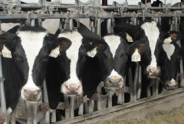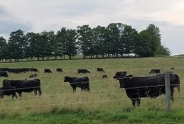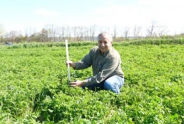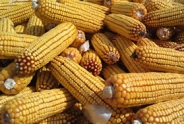Recommendations for Livestock Sales During COVID-19
Ashley McFarland, Area Livestock Specialist
Central New York Dairy and Field Crops
Last Updated: March 24, 2020
For Those Hosting Sales
- restrict general public access
- limit attendance to a maximum of current local, state, and federal guidelines
- consider online photos and videos as an alternative to in-person viewing
- make animals available for viewing by only "small" groups prior to the sale
- do not shake hands, and maintain a social distance of at least 6-feet
- restrict access to "pets" that could be coughed on and touched by multiple hands
- make online, or phone bidding available where possible
- provide information to employees on COVID-19
- provide hand sanitizer in common areas
- provide space for hand washing
- consider not providing food, if food is provided, consider individual packages and serving to avoid surfaces being touched by multiple hands
- frequently sanitize workstations and eating areas, including special attention to telephones, computer keyboards, calculators, desks, photocopiers, counters and common areas shared by more than one person on a regular basis.
- avoid check-out/payment line congestion areas
For Those Purchasing Livestock and Attending Sales
- where possible only view animals in "small" groups ahead of the sale
- consider online photos and video as an alternative to in-person viewing
- utilize sale manager, auctioneer, ringmen and consultants to help with purchase
- allow only one person per farm operation to attend
- do not attend sales without a serious intent to purchase
- do not attend a sale if you are sick (even mild symptoms), or have been exposed to anyone sick, and/or positive for COVID-19 in the last 2 weeks.
- do not shake hands, maintain at least 6-feet social distance
- do not take your dog/cat that could be coughed on and touched by multiple hands
- consider online bidding, sign up for online platforms ahead of time
- consider phone bidding, call ahead to make arrangements with sales staff
- avoid check-out/payment line congestion areas
- wash hands thoroughly and frequently
This is not an exhaustive list, and businesses should stay up-to-date on their local, state, and the federal government recommendations and requirements. By working together, with good preparation, we can keep our families, customers and employees safe, while also providing stability within the U.S. beef supply chain.
This document was originally developed by the Livestock Markets Association of Canada, Canadian Beef Breeds Council and Canadian Cattlemen's Association, and then adapted and approved by the Indiana Board of Animal Health, Purdue Veterinary Medicine, Purdue Animal Science, and the Indiana Beef Cattle Association.
Find this content at https://www.ansc.purdue.edu/SP...
COVID-19 Livestock Sale Recommendations (pdf; 131KB)
Upcoming Events
Fresh Cow Health Disorders - Spanish
July 19, 2024
July 26, 2024
August 2, 2024
August 9, 2024
August 16, 2024
August 23, 2024
August 30, 2024
Free webinar series in Spanish.
Calving Workshop
August 6, 2024 : Calving Workshop
Herkimer, NY
English / Spanish program. Limited to 8 English speaking & 8 Spanish speaking participants. Lunch included.
Announcements
Document and Share Storm Damage
Mother nature has really been difficult over the last few days. Significant damage has been seen throughout NYS. Please let us know what types of damage your farm may have sustained during this time. This could be in the form of property damage, lost power, milk dump due to lost power, loss of livestock, loss of stored feed or growing crops.Farms are encouraged to DOCUMENT AND SHARE any impacts the weather may have had on their home or business. This could include structure damage, crop loss, inventory loss due to power outages, damage to equipment or fencing, and more.
If your farm experienced any sort of damage, please reach out to any of the folks listed below (or all of them). The more impact information that is collected, the greater the likelihood of a disaster declaration which can bring vital emergency support and awareness. The CNYDLFC Team will continue to collect detail and submit to NYSDAM and the EDEN network.
Reporting Weather Related Impacts (For your home or farm business)
- First, ensure that all the people and animals on your farm are safe, and that there aren't any unsafe working conditions created because of the weather (check your structures!). If there's an emergency, call 911 - don't try to manage it all on your own.
- Second, document all negative weather impacts for your farm and their estimated financial cost. Take photos, make estimates, and put it all in a safe place.
- Reach out to your insurance providers - farm, vehicle, crop, etc. to initiate the claim process as needed.
- Then, share your farm's damage with any (or all) of the ag support agencies listed below. We all work together to collect storm damage information and funnel it up to Ag and Markets which can initiate a natural disaster declaration.
- Chenango: 607-334-5841
- Fulton/Montgomery: 518-853-2135
- Herkimer: 315-866-7920
- Madison: 315-684-3001
- Otsego: 607-547-2536
- Schoharie: 518-234-4303
- Saratoga: 518-885-8995
- Nicole Tommell: 315-861-6001
- Erik Smith: 315-219-7786
- Daniela Gonzalez: 315-749-3486
- Ashley McFarland- 315-604-2156
Your county USDA/FSA service center.
- Chenango: 607-334-3231
- Fulton/Montgomery: 518-853-4015
- Herkimer: 315-866-2520
- Madison:315-824-9076
- Otsego: 607-547-8131
- Schoharie: 518-295-8600
- Saratoga: 518-692-9940
Your county farm bureau manager
- Region 3: Bailey Coon: 518-937-0566
- Region 5: John Wagner: 315-761-9770
- Region 6: Natally Batiston: 518-937-0269
- Region 7: Todd Heyn: 518-431-9338
Please let us know how we can help you.
Cash Rent and Custom Harvest Survey
To date, there is limited information available about rental rates and fees for crop harvesting. Farms can use this valuable information for their farm business planning to help improve decision making and profitability.Farmers Can Join MeatSuite For Free!
MeatSuite.com is a free resource provided by Cornell University where NY meat farmers can create a farm profile and list their bulk (wholes, halves, quarters) and bundled (i.e. Grilling Bundle) meat products.Why should farmers join?
1. It's free and easy!
2. Connect with more local customers. In the past year the MeatSuite.com farm directory had 8,300 visits from New York consumers. Farm profiles get as many as 25 views per month from potential local customers. We also spotlight MeatSuite farms on social media and bring attention and purchases to farms through highlights and giveaways.
How do I join?
Farmers can visit https://www.meatsuite.com/farmers/ to create a free farm profile. You must list at least one product for your farm's profile to go live. You'll also have access to Cornell's free Meat Price Calculator, a helpful tool for pricing your meat to make a profit.
While you're on MeatSuite, check out the "Creating Consumer-Friendly Bulk Meats" publication on the log-in page. It has tips on how to create bulk meat products that are easier for first-time buyers to say "yes" to.
If you have any questions as you create your farm profile or products, we're here to help! Please email Matt LeRoux at mnl28@cornell.edu.




